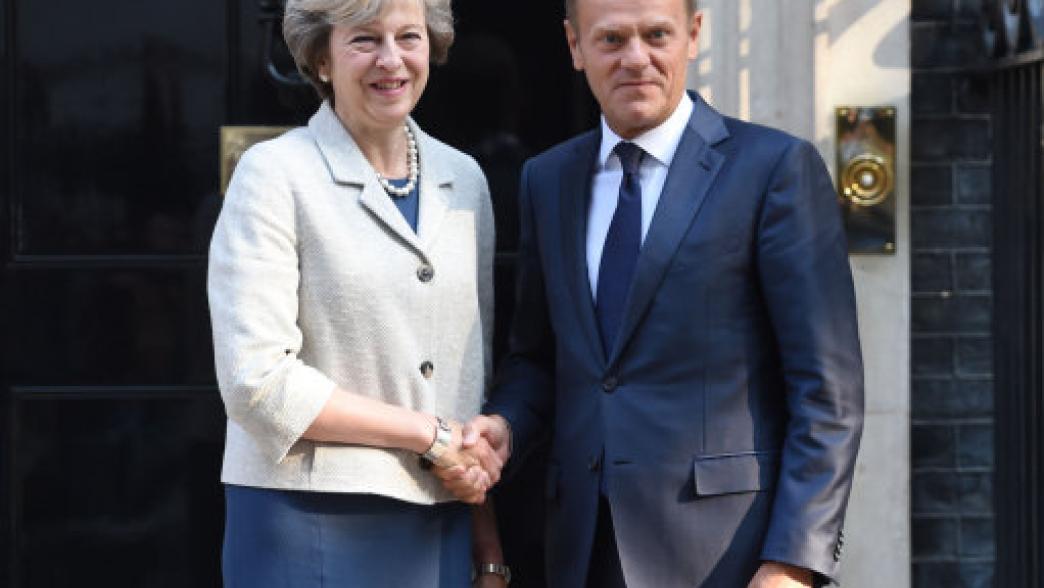
Next week Theresa May has to write her "Dear Donald" letter to the European Council President, Donald Tusk. But, Jill Rutter says, there is no script for this unprecedented move – so how might she decide to start the long goodbye?
The Prime Minister could write our Article 50 exit letter in several ways, with different purposes in mind. If the aim is to make constructive and rapid progress, the best options would be to take the initiative and start to frame the process she wants to see. But she will also be conscious of the domestic audience as she signals her intent.
Some possible options ahead of triggering Article 50 on Wednesday:
Short and sweet
Technically the Prime Minister need do no more than give notice that the UK intends to leave the EU. She really needs to write nothing more than:
Dear Donald, we’re off.
But that means missing an opportunity to do more. Below we look at what that might look like.
Set the mood
She could add some diplomacy, drawing on her Lancaster House speech.
Dear Donald,
As you know, on 23 June the UK people decided that the UK should leave the European Union and I hereby give notice of our intention under Article 50. As I and my colleagues have made clear, it is in our mutual interest for the UK and the EU to thrive, and my desire is that our negotiations set us on a path to a positive new partnership between the UK and the EU that recognises our continuing ties and shared interests.
Pitch the process
Another option would be to make a pitch for the negotiating process that the UK would like to see, a counterpart to the emerging guidelines from the EU.
Dear Donald,
I am today giving you notice of the UK’s intention to leave the EU in accordance with the processes laid out in Article 50.
In the view of the UK Government, the best way of meeting the terms of Article 50 is to agree the exit arrangements and a new comprehensive Free Trade Agreement in parallel. As you know, I am particularly keen that we reach rapid agreements on the rights of all our citizens who have chosen to exercise their rights of freedom of movement and live in the UK or another EU member state. I would hope to conclude this agreement outside the formal Article 50 process, so that we can give our citizens the assurance they deserve.
I hope you and fellow European Council members will give due priority to a speedy resolution to remove this uncertainty. I am also keen that we can move quickly to find a solution to the special issues, which I know the Council appreciates around the border between Northern Ireland and the Republic.
Make an offer
The Prime Minister could go further and add some substantive offers to her letter. That could be on EU nationals – or even money.
Dear Donald,
I am today giving you notice of the UK’s intention to leave the EU in accordance with the processes laid out in Article 50.
I realise that time is pressing and there is much to be resolved in a short period. To make progress, I have instructed my negotiating team to table proposals for guaranteeing the reciprocal rights of citizens and a proposal on resolving the issues around the so-called “divorce bill” with Michel Barnier.
We believe these proposals offer a constructive basis for future engagement and will allow us to move swiftly to discuss the vital issue of the comprehensive free trade deal we firmly believe is on the economic and political interests of the 27 member states as well as the UK.
Throw down the gauntlet
An alternative option would be for the Prime Minister to set her baseline – as zero. This may play well for a domestic audience but may reduce her room for manoeuvre in the future.
Dear Donald,
On 23 June the British people voted to leave the European Union. Article 50 obliges me to give notice of our intention to leave, which I hereby do on behalf of the people of the United Kingdom.
There are urgent issues to resolve – not least on the outstanding issues of UK nationals with residence rights in other EU countries and their counterparts who have chosen to live and work in the UK. I also want to make progress on resolving the issue of the border in Ireland.
But as the UK prepares to leave the EU, I must warn you that I can see no justification for the UK making a vast exit payment after years in which it has been a substantial net contributor to the EU budget. Nor will I be able to accept any arrangements which retain ECJ jurisdiction through the backdoor. I also give notice that we will regard 29 March as a cut-off for future inward migration from the EU. We have a mandate from the people to “take back control” of our borders and our laws. If this ultimately means that there is no “deal” – something I believe is in neither the interests of the UK nor the EU27 – then the UK will ensure it is ready to cope with the consequences.
Conclusion
The Prime Minister may end up with a mix of these approaches – or do something completely different. Next Wednesday we will no longer have to speculate – and the next phase of Brexit will begin.
- Topic
- Brexit